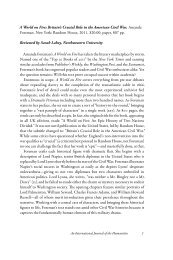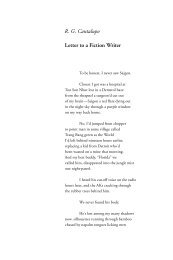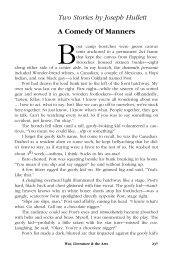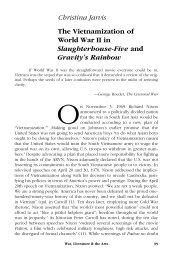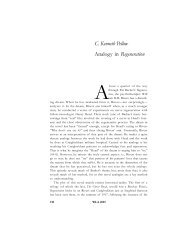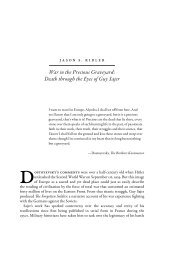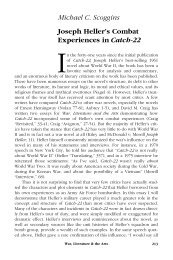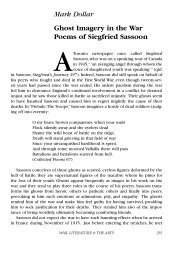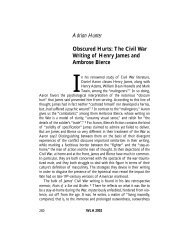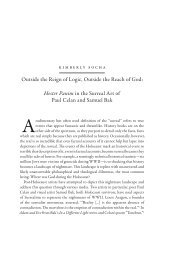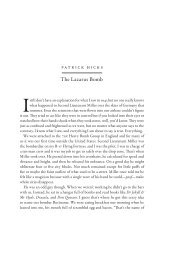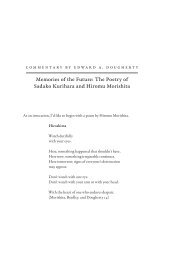Joseph T. Cox
Joseph T. Cox
Joseph T. Cox
Create successful ePaper yourself
Turn your PDF publications into a flip-book with our unique Google optimized e-Paper software.
<strong>Joseph</strong> T. <strong>Cox</strong><br />
Notes from Ban Me<br />
Thuot<br />
At zero-nine-ten, I wandered into<br />
the operations section where Jess,<br />
Major Witherspoon, and as<br />
sorted operations staff were silently<br />
listening through the static on the tactical radio. Over the buzz, a voice<br />
cracked, “Oscar-six-alpha, how many were on board, four or five? Hell, we’ve got<br />
enough parts here for six body bags, over.” The big Okie radio operator replied,<br />
“Romeo Zulu, according to our manifest there were only four, over.”<br />
Major Witherspoon spat on the dirt floor and wiped his sweaty face with a<br />
dusty rag. SGT Stevenson, a muscular red-head, whistled, “Damn, I just saw ole’<br />
Captain Ray and the el tee at coffee.” Jess just stared at the radio hard, his blue<br />
eyes never blinked.<br />
Jess and I had been scheduled to make the flight north to the industrial<br />
site named Waite-Davis but gave up our seats on that morning’s<br />
aircraft to the Group surgeon and our refrigerator repair man, a favor<br />
granted as casually as one of Colonel Buckton’s insults. With the Colonel’s<br />
final threat that if the refrigerators were not up by noon, he would have<br />
Chief Lopes’s “spic ass,” the junior officers left the morning briefing and<br />
adjourned to the mess tent for coffee and a parody of the good colonel’s<br />
morning performance.<br />
The only West Pointer, other than Colonel Buckton himself, Jess had commanded<br />
a remote, land-clearing company for six months where his wounds earned<br />
him purple hearts and authenticity, estimable stock in a combat zone. Much to his<br />
chagrin, he was finishing his tour in the relatively safe Engineer Group Operations<br />
TOC (Tactical Operations Center). Jess was the longest in country, the biggest<br />
soldier on the compound, and our acknowledged and undisputed moral authority.<br />
WLA 2001<br />
223
If Jess thought something was wrong, we paused to reassess our position. Of<br />
course, Jess hardly ever questioned the most hare-brained scheme, thus his unchallenged<br />
supremacy in the unspoken hierarchy of the informal bureaucracy.<br />
In fact, about a month earlier, it was Jess’s idea to pitch rocks on the tin roof of<br />
the field grade bunker and scream, “INCOMING!” In the dark mad scramble, the<br />
fat major broke his arm trying to get to the fighting position. Major Witherspoon,<br />
who hated the fat major as much as we did, had to use Jess’s West Point credential<br />
to argue the colonel out of pressing charges against us all.<br />
I looked to him to see me through this crisis, too. Jess would be able to make<br />
sense out of our very close call. His silence and distant stare unnerved me, and I<br />
felt a chill in the crowded heat of the TOC. In the dark of the sleeping bunker, I<br />
lay on my poncho, my mouth full of ashes, morning coffee acid boiling in the back<br />
of my throat, fumbling to pull the flip top on a warm Falstaff beer.<br />
Ray, Dan, Doc, and Mr. Lopes had tried to fly below the highland clouds but<br />
slammed into a mountainside. “Romeo Zulu, according to our manifest there were<br />
only four, over.”<br />
Drinking the second warm beer, I stared through the dust particles<br />
that rose in the slivers of sunlight and listened to roaches scurry across<br />
sand bags, the buzz of a fly, the distant crackling refrain of a tactical<br />
radio, and the steady stroke of my heart beat, louder and louder. Jess<br />
found me around noon and asked me to help him get the dead guys’ kit<br />
in order.<br />
We didn’t say a word as we inventoried the footlockers. I yearned for<br />
a wise-ass comment that would make small sense of second lives. I thought<br />
back to the morning coffee and how in his best Buckton voice Jess had<br />
lampooned the oh-six-hundred briefing, “Lopez, you better have that<br />
refrigerator perturbation under control by lunch, or I’ll find someone with<br />
half a brain who can do the job right.”<br />
Lopes stirred his coffee and muttered in his cup, “Can you believe dat<br />
asshole. I’ve only been working for the shithead for seven months, and<br />
he doesn’t even know my damn name.”<br />
Captain Gage, the Intelligence officer who was always sweating added,<br />
“I couldn’t believe how he reacted to that shit about the kid at Whiskey<br />
Mountain. The one who got his leg caught in the rock crusher.”<br />
Jess pointed out, “You could see wheels in his head turning. His first question<br />
was, ‘How long did you say the plant was down?’ He never asked if the kid was<br />
alive, did he lose his leg? No, ‘How many hours did you say the plant was down?’<br />
He was trying to figure out how hard the battalion was working before the acci-<br />
224 WLA 2001
225<br />
dent. He had to make up his mind if they were using the accident to cover up their<br />
poor statistics, if he had to go down there and kick some ass.”<br />
Gage added, “What a cold blooded bastard! Lopes, just cut the asshole’s heart<br />
out and carry it with you up to Waite and stick it in the fridge—permafrost!”<br />
“Did we ever find out what happened to the kid? Did he lose his leg?”<br />
“Everything is numbers. People are numbers. Production is numbers.<br />
It’s a war of attrition, and Buckton’s a cold-blooded, heartless computer.<br />
Every stretch of pavement is one more step on his path to a star, and he<br />
knows that the higher-ups have their calculators out measuring his leadership<br />
just like he’s measuring us.”<br />
Tired of what he considered work talk, Ray Lanning, a stringy Texan<br />
with an exaggerated drawl, adjusted his aviator sun glasses and theatrically<br />
drew out what he hoped to be the last word on our esteemed<br />
leader, “Hey, it’s the only god damned war we have. What do you all<br />
fuggin’ expect? Ghandi, Martin Luther King, or somebody who gives a<br />
rat’s ass about some numb-nut, pot-smoking private who slips and falls<br />
in a rock crusher? Shit, as long as the kid didn’t loose his nuts, he’ll be<br />
back home in a month and collecting full disability!”<br />
In what seemed to be his natural state, Ray was nursing a serious<br />
hangover. As an Engineer Group aviation detachment commander, he<br />
felt he was missing the shooting war of gunship pilots but made up for<br />
his deep and bitter disappointment by sitting in a lawn chair on top of<br />
the O Club bunker raising beers every time incoming rockets randomly<br />
tore up the airfield.<br />
Dan Dougherty, Ray’s copilot, on the other hand, didn’t drink and<br />
carried a Bible. He quietly stirred his coffee, shook his head at Ray’s<br />
exaggerated cynicism, and knew what was coming next. As usual, in part<br />
because of Dan’s squeamishness, and in part because Ray’s imagination<br />
never strayed far from the mostly fictitious world of his sex life, Ray<br />
quickly turned to a conversation you might hear if dogs could talk.<br />
Dan tried to look bored as he sipped his coffee, but Ray smiled his<br />
gat-toothed smile and continued, until Jess added the last word to the<br />
morning coffee klatch, “Ray, I sure am tired of your disgusting bullshit! Let’s get<br />
to work.”<br />
Following Jess’s benediction, Ray and Dan picked up their hats, swatted at the<br />
flies, and raised the tent flap. Ray adjusted his aviator glasses, breathed in the<br />
heavy air, and exhaled, “Awh-he-yauh!, the fresh smell of burning shit! Lovely<br />
Vietnam, the civilization that took two thousand years to learn to carry two piles<br />
of shit with one stick and eat a pile of shit with two.” We answered Ray’s host-
226<br />
WLA 2001<br />
country cultural synopsis with our wishes that he go screw himself and have a safe<br />
flight.<br />
“Romeo Zulu, according to our manifest there were only four, over.”<br />
That day I had my fill of haphazard, senseless destruction. Almost a<br />
year of booby traps, mines, casual rockets, unseen snipers. The desultory<br />
violence and the random waste of lives. American and Vietnamese. Soldier<br />
and civilian. The very young and the very old. Victims of accidents<br />
in the air, accidents on the roads, ambushes, and, always, a pervasive<br />
and wanton disregard for life and decency that characterized this war.<br />
The teenage woman on the back of a moped hit by a speeding GI<br />
truck lying face down in sticky, fly-covered blood. Her hips shattered,<br />
body twisted so that her small feet pointed up. Her dark, flitting eye the<br />
only sign of life.<br />
The dead, dismembered Vietcong’s torso and limbs planted in<br />
Montagnard earthenware pots and left, fly-covered, on the hairpin turn<br />
of a mountain road as a warning, a sign.<br />
The two soldiers who feigned engine trouble to stay behind the convoy<br />
for the wet of warm beer and sex, ambushed a few miles from the<br />
work site. When I got to the bullet-riddled vehicle, stepped up and opened<br />
the door, the driver’s pooled guts and blood splashed over my legs and<br />
feet and soaked the red dust of the road. The dead driver’s partner sobbing<br />
a half mile back where he had jumped and hid in the open sewer<br />
that ran next to the road.<br />
For weeks after that ambush, every time I walked by the bullet ripped<br />
truck, clouds of flies would rise from the cab where remnants of viscera<br />
rotted in the still, hot air.<br />
It was the same stumbling hum of flies I heard every time I went into<br />
the latrine to take a dump. The same murmur that rose in a cloud over<br />
the woman dying in the road and from the swarm that feasted on body<br />
parts in Montagnard crockery. It was the zoom that greeted those who<br />
found an airplane disintegrated on a mountainside, its human freight smashed,<br />
sliced, and scattered in the elephant grass.<br />
“Romeo Zulu, according to our manifest there were only four, over.”<br />
Imagine those who found the wreck, bent over like farmers planting<br />
rice in the valley below. A rescue party harvesting bone and body parts<br />
from among shattered airplane pieces, solving the puzzle of mangled<br />
flesh, trying to make whole a scene of schemeless mutilation. Did they<br />
ever sort out the gore? Does Ray’s family know that perhaps it is Dan’s
227<br />
mutilated hand folded on their son’s torn chest, or what is left of Mr. Lopes’s<br />
shattered leg stuffed alongside Doc’s torso in the cheap tin coffin. All as one making<br />
its way home on slow cargo planes.<br />
Buried in small towns, different body’s body parts stacked as are the<br />
names on the granite wall. What do we carry from that wreck? Memory<br />
and monument. Time and death fold in on themselves.<br />
And that night in Ban Me Thuot, in the old French hotel with the high<br />
ceiling and empty bar, after we spent the afternoon inventorying their<br />
footlockers, and in the process lifted a bottle of Ray’s Jack, Jess and I sat<br />
silently drinking neat whiskey like cowboys in a bad movie. Perhaps it<br />
was a dream, or is a dream now, but it happened, and that night in Ban<br />
Me Thuot is with me still. As is the piano up against the dark wall and<br />
Jesse picking notes carefully, trying to play Mozart, through a drunken<br />
haze to the rhythm of the distant echo of B-52 strikes just over the Cambodian<br />
border.<br />
The big, balding, dirty soldier, playing beautiful music deliberately on<br />
a dusty, untuned piano. Two of us alone, as head-ache drunk and silent<br />
as that night after Jess helped me get the truck and the dead boy back to<br />
the compound, and I tried to wash the blood off my legs and boots but<br />
could never get rid of the smell. The smell, the dust, the dry headache,<br />
and Jess’s sweet notes leaving the big room for the night air and beyond—his<br />
big, filthy fingers picking just the right small notes.<br />
<strong>Joseph</strong> T. <strong>Cox</strong>, Ph.D., is Headmaster of The Haverford School in Haverford,<br />
Pennsylvania. A thirty-year Army veteran, he commanded from the platoon to the<br />
battalion level and served as an Academy Professor at The United States Military<br />
Academy. His collection of poetry, Garden’s Close, will be published by Thirteenth<br />
Angel Press in the Fall of 2002.



